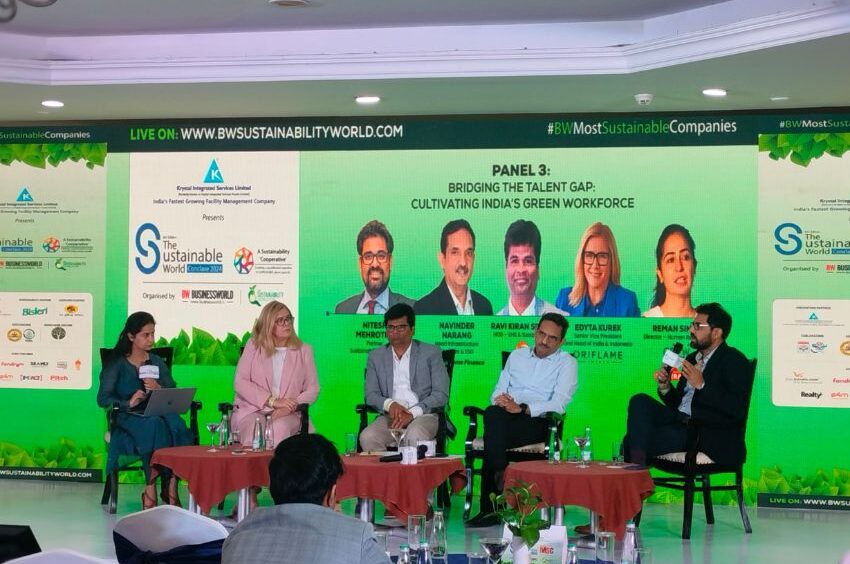Empowering Change: Formulating A Sustainable Workforce For Future

Amid rising environmental challenges across the globe especially in emerging economies, experts highlight the importance of sustainability education in India
A butterfly flapping its wings can create small turbulence that can start a chain reaction, leading to a typhoon in another part of the world. Nothing is surprising about this, as research confirms this ‘Butterfly Effect’, meaning climate has no borders.
This necessitates a dynamic global strategy to combat ‘inevitable environmental degradation’ and advance sustainability. According to industry experts, there is a need to bolster sustainability and develop a workforce adept in sustainable business practices, especially in the context of India.
To Fill Greener Workforce Gap
Environmental sustainability requires sustainable business practices. Experts believe that filling the greener workforce gap does not demand extraordinary talent but a shift in mindset. The current workforce needs to recognise the urgency of keeping global temperatures below two degrees.
“Make the employees live the change. One week a year or three days a year for that employee who has been always in an urban environment. Make him undergo some kind of a module of training or living in those areas which are suffering,” said Navinder Narang, Head Infrastructure Facilities & Environmental, Social, and Governance (ESG), ICICI Home Finance Company.
The urgent need for sustainability has opened up significant opportunities for specialists in the field, registering increased interest in formal education related to sustainability and ESG. Experts observe that students are now pursuing careers in sustainable practices.
“There are some elective courses, especially on building sustainable and livable cities, responsible business operations, and green business management. Earlier I heard that there is not much interest shown by the students, but in the last year, people are going ahead and planning a career. Apart from IIM’s, there are other institutes too offering sustainability management,” said Ravi Kiran Sivala, Head Of Department – Environment, Health and Safety (EHS) & Sustainability, Sun Pharmaceuticals.
Broad Brush Approach Or Specialist Skills ApproachA never-ending debate in building a greener workforce centers on whether employees should be generalists or specialists. This raises the question of the broad brush approach, which addresses issues in a general manner, versus the specialist skills approach, which focuses on specific competencies. Experts argue that coherence is essential; individuals may not be specialists but should possess the ability to bridge gaps and solve problems effectively.
“If someone in finance says, I don’t know carbon accounting. I don’t know water accounting. I don’t understand how do I measure circularity. One cannot be called a finance person. I think that’s the level of skilling that needs to happen,” said Nitesh Mehrotra, Partner, Sustainability and ESG, EY India.
Price Compatibility IssueSustainable technology is still evolving and requires more resources than traditional production methods, which makes eco-friendly products and services more expensive. Experts advocate for addressing the price gap and customers’ education.
“The price is the biggest decision-making element. It’s very difficult to manufacture sustainable products, and clean products for the same price as average products. Still, sustainability is more expensive. But, it’s again about educating customers to how to read it because we have to take care of the planet’s future,” said Edyta Kurek, Senior Vice President and Head of India and Indonesia, Oriflame.
While moderating the sixth edition of the Sustainable World Conclave 2024, Reman Singh, Director-Human Resources; Council on Energy, Environment and Water (CEEW) said, “India alone is going to need 9 crore jobs by 2030. The jobs are not going to come just from the traditional sectors of solar rooftops or wind, but are going to need a lot more green jobs across various states in India to get there. Skilling has to become the ‘DNA’ of every organisation.”
Meanwhile, experts noted that real change requires bottom-up adoption, and everyone can play a crucial role as catalysts in organisations, families, and communities. To tackle pressing issues, there is a need for the best minds engaged and they will only get involved if there is awareness and understanding at the grassroots level.




































































































































































































































































































































































































































































































































































































































































































































































































































































































































































































































































































































































